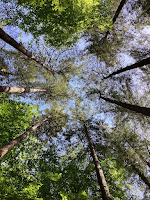Liveblogging from the final day of WILU conference In Vancouver, Canada.
200 Trees: A Place/Based Learning Approach to Information Literacy and Outreach was presentation from Catherine Bowers (Librarian Associate Professor, Odum Library, Valdosta State University, USA). She has a background in cultural anthropology, and some of her teaching approaches include zine making a wiki-thons.
The background to the presentation was a hurricane in 2023 which felled over 200 trees on the university campus. There is a lot of complexity to the history of the land that the university is on and trees are important to the place (there is a Herbarium). The campus newsletter highlighted the tree loss (one of the trees was 300 years old) but the media didn't see this as a "story".
Connecting this with place-based education, this centres on fieldwork, observation, authentic encounters and can be connected to environmental justice. Land based education is distinct from this, connected to indigenous knowledge, but in this case the focus was on place-based. The concepts that stimulated the project are to do with ecological literacies, information seeking behaviour, chronotopy (and some others) and there were a couple of articles/presentations (I think that this was one). Pedagogically she adopted the ideas of high impact practices and critical information literacy. An interesting debate was whether this was outreach, pedagogy or programming pedagogy.
Greer wanted library outreach, to work with students and to work with the landscape/grounds crew.
The initial idea was to have a student tree walk, with people identifying their favourite tree. However, it turned out there was already a tree walk and historical plants tour, organised by a different department.
Changing the strategy, they had a zine workshop, and student nature journaling. The library distributed notebooks, had a workshop to promote techniques,and there was a LibGuide (see below) and social media coverage (but no uploads of journals so far). Greer also worked with archives and special collections to have something to archive information about the trees, and numerous documents were added to the archive. Experts from the biology department talked about the history of the trees/area.
A key thing was collaboration with two applied theatre students (the applied part is related to theatre of the oppressed). They discovered there had been a tree funeral in the past, and also confirmed there was a lack of information about the trees. The students developed a tree funeral, including a ceremony for the 300 year old tree. Bowers worked with the Grounds Supervisor, who was obviously invested in
the trees and was interested in having more connection with students.
She also coordinated a funeral. The students also involved other students in asking them about how they felt about trees etc. and delved into the archives. There was also media coverage.
Greer talked about evidence so far and future directions: a key future plan was identifying gaps in knowledge. Also she talked about the messiness of the project, how its shape was changed by campus relationships, opportunities etc.
There is a LibGuide on Campus Trees, Plants & Green Spaces at https://libguides.valdosta.edu/200trees
Photo by Sheila Webber: trees in Stanley Park, Vancouver, May 2024

No comments:
Post a Comment